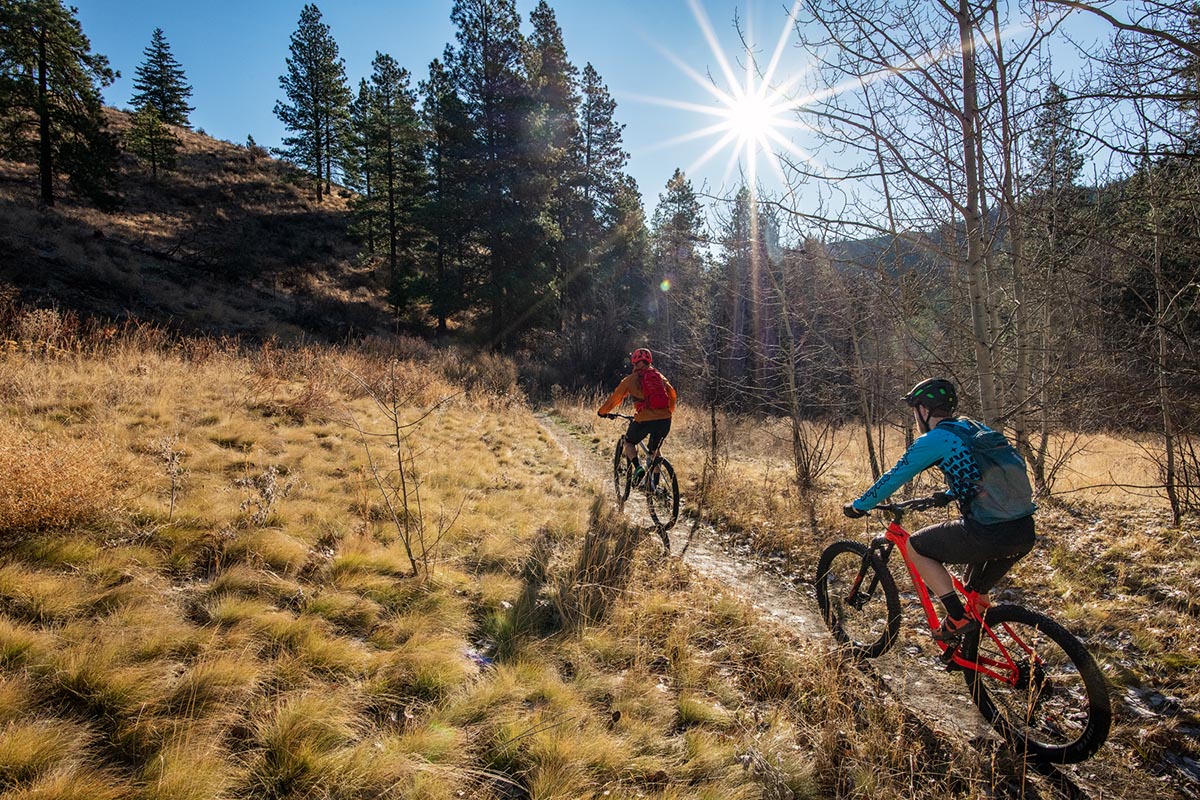
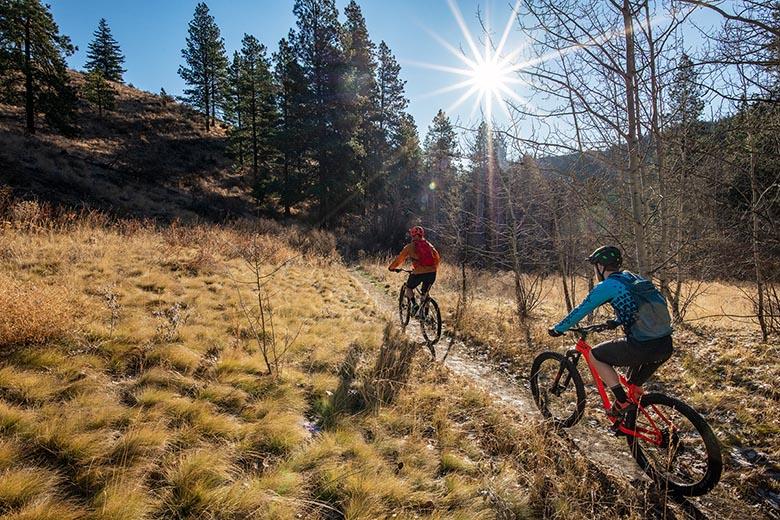
The mountain bike market has drastically changed over the last couple decades, but there’s one fact that’s stayed steady: The sport is expensive. It's no exaggeration that carbon full-suspension builds can top the price of a nice used car. That said, we firmly believe that no mountain bike should send you into near-bankruptcy, and there are plenty of great options out there for all skill levels and budgets. We’ve done the heavy lifting by breaking down the price ranges for mountain bikes—from about $500 all the way up to $6,000+—and what kind of performance, components, and popular bikes and brands you can expect to see at each. For a wider look at the market, see our articles on the best trail mountain bikes, best trail MTBs under $1,500, and best trail MTBs under $2,500.
Editor’s note: We updated this article on June 28, 2024, to reflect the current state of the mountain bike market. This involved tweaking our price ranges slightly as bike costs have gone up across the board, as well as making sure all prices and specifications were accurate at the time of publishing.
Before diving in, we need to address the sub-$500 bikes category. You might have seen the likes at your local Target or Walmart, and there’s no doubt the low price, knobby tires, and familiar-looking build can be appealing. However, take any of these rigs out on the trail and you’ll soon realize that they’re not designed to handle rough (or even moderate) terrain. These bikes are often heavy, made with low-quality parts, and likely won’t survive a season of singletrack. Without a doubt, we suggest spending up and exploring the categories below instead.
.jpg)
Those shopping for their first bike or unsure about their commitment to the sport can certainly find a passable model for under $1,000. But if you plan to tackle anything but rolling gravel and smooth singletrack, we recommend starting your search around the $1,000 mark. Throughout this price range, we advise keeping it simple: an aluminum hardtail with 27.5- or 29-inch wheels. Although it’s possible to find budget-friendly full-suspension bikes, it's generally best to steer clear. The rear shocks add extra weight, the suspension designs are basic and underwhelming, and you'll be getting noticeably downgraded parts like brakes and shifters. But the good news is there are a number of suitable hardtails out there under $1,500, which are an excellent way to get a feel for the trail, learn the ropes, and even dip your toes into bikepacking if that's of interest.
.jpg)
Bikes under $1,000 often have relatively simple and heavy parts, from the crankset and drivetrain to handlebar and seat post. The drivetrains, or components that allow you to shift gears and transfer power, generally won’t provide the same precision when shifting as pricier models. These bikes also generally don’t have dropper posts and feature mediocre suspension (read: they’re not well suited for technical terrain). In our opinion, the $1,000 to $1,500 range is the sweet spot for beginners looking for a starter hardtail. Here, you’ll find higher-quality 1x drivetrains (generally ranging from 10- to 12-gear options), better and squishier front suspension (100 to 130mm), hydraulic disc brakes, and even entry-level dropper posts.
.jpg)
There are some bargain-basement options out there, but around $600 is where we start to see decent entry-level rigs like the Cannondale Trail 5 ($670) and Co-op Cycle’s DRT 1.1 ($599) start cropping up. But in general, you’ll get much more versatile, fun, and longer-lasting options by spending slightly up. One of our favorite bikes in this price range is Salsa’s Rangefinder Deore, which retails for $1,199 and boasts beefy 29-inch tires, a dropper post, disc brakes, an 11-speed Shimano drivetrain, and 120 millimeters of front suspension. For around $150 more, Cannondale’s Habit HT 2 features more modern geometry and added squish up front for soaking up bumps on steeper and more technical trails. Big players like Trek, Specialized, and Marin offer plenty of quality hardtails at this price point, too.
.jpg)
At the lower end of this price range, you’ll find increasingly capable bikes—especially hardtails—that come with a good bump in quality and performance. As price goes up, you’ll also get a wider selection of full-suspension options that are much better equipped for tackling technical terrain, although they’ll be heavy and have lower-quality components than similarly priced hardtails. In addition, weight will start to drop, although you won’t find many rigs made with lightweight carbon fiber just yet. Regardless of the type you choose, those who have spent some time on the trails or are ready to up the ante will be able to find plenty of dependable, fun, relatively affordable bikes.
.jpg)
The quality of drivetrains and other components will vary greatly between $1,500 and $3,000, from the fairly middling SRAM SX Eagle drivetrain at the lower end of the spectrum to SRAM’s NX and GX and Shimano’s SLX and XT at the top. Gearing will venture toward the standard of modern mountain biking: 1 x 12. Compared to the options above, you can also expect better suspension. Creeping into the high end of the range, both hardtails and full-suspension bikes have made serious inroads over the years. Especially from consumer-direct brands, it’s now possible to find excellent rigs with lots of squish and decent components here. The biggest downside of full-suspension bikes at this price is weight—they’re much heavier than what you’ll find by spending up for a comparable but more premium build.
.jpg)
It’s no surprise that you’ll still pay a premium for name brands, but the good news is that bikes in this price range have more modern builds and features. Salsa’s Timberjack XT hardtail ($2,499) is one of our longtime favorites in this category with a well-thought-out spec package that includes burly 2.6-inch tires, a highly adjustable 130-millimeter RockShox 35 Gold RL fork, and plenty of mounting locations for bikepacking gear. For full-suspension options in this price range, we recommend looking to consumer-direct brands like Ari, YT Industries, and Polygon for the best value. We like Ari’s Cascade Peak Pro in particular, which retails for $2,999 and features everything we’d expect from a pricier rig, offers a very smooth ride, and comes with a lifetime frame warranty (though it’s a bit heavy).
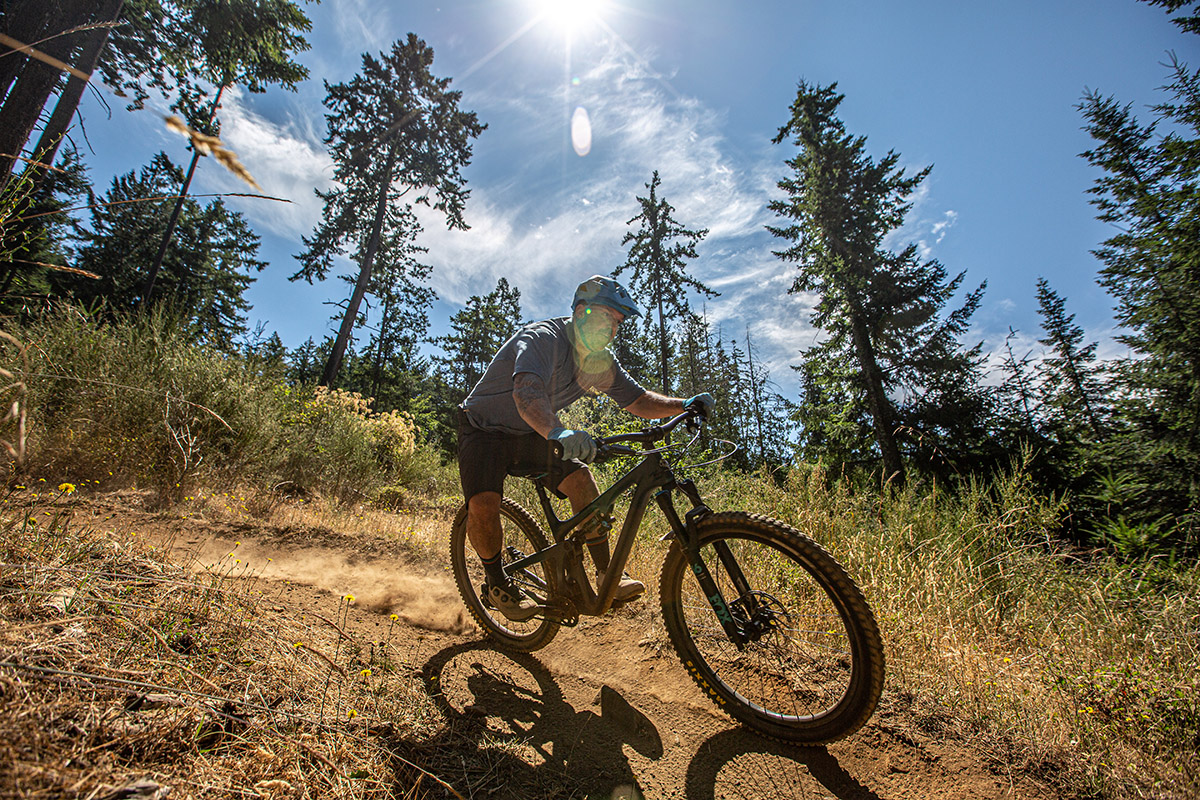
As you pass $3,000, lightweight carbon fiber models start popping up. Parts will be upgraded, too—no more SRAM SX drivetrains. Expect smooth shifting and braking and lower weights across the board. Bikes also begin to separate into more clearly defined cross-country, trail, all-mountain, and downhill categories—each with its own set of priorities. A downhill biker, for example, will likely want beefy suspension upwards of 160 millimeters, while cross-country riders aimed at going fast and light are typically willing to sacrifice some squish in the name of efficiency.
.jpg)
Predictably, components of bikes in this range get nicer, lighter, and more durable as cost increases. The biggest difference here compared to the categories above is that carbon becomes the norm, resulting in a notable reduction in overall weight. Components get upgraded, as well: Brakes are a little smoother, wheels a little lighter, and tires more premium. At the upper end of the range, you'll also start to see wireless drivetrains cropping up, which make for extremely smooth and reliable shifting and require less maintenance over time.
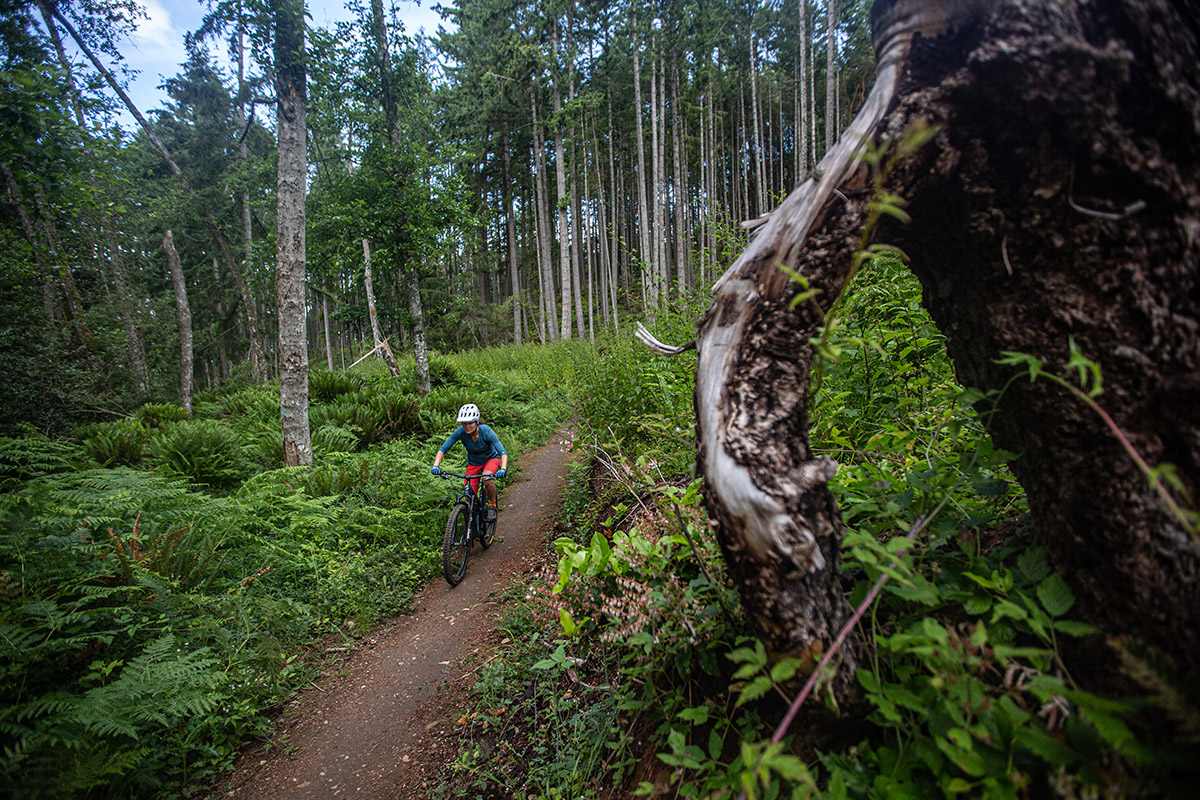
Every major bike brand has a number of offerings at this price point. That said, we recommend narrowing down your search to recent releases (within the past year) so that you get the most up-to-date geometry and features for your money. For the most bang for your buck, consumer-direct companies like YT, Canyon, Commencal, and Ari are the way to go. The biggest downside is that you won’t be able to try bikes out before you buy, and you may experience delays with customer service and warranty claims. If these are dealbreakers for you, there are plenty of name-brand options available, too. Santa Cruz’s Hightower S ($5,899), for example, features a lightweight carbon build, 29-inch tires that smoothly roll over rocks and roots, and a just-right amount of suspension to balance long stints of uphill pedaling and steep, technical descents. And for those willing to sacrifice some of the latest and greatest tech, you can often find past-season models at a discount, pushing even higher-end offerings into this price range.
.jpg)
Those looking in this category ride often and ride hard, and they likely need a rig with the performance and specs to match. Carbon is the name of the game in this price bracket—look for an emphasis on weight savings; top-of-the-line components; and high-end, electronic drivetrains. Many of these elements can be nice to have but are by no means essential for casual riders. If you have your sights set on competitive racing, however, this is what you can expect to spend.
.jpg)
Full-suspension mountain bikes dominate the $6,000+ market, and the majority of the designs are made with a carbon fiber frame. If you’re willing to spend up into this price range, you likely have your sights set on eliminating all that’s extraneous and getting weight as low as possible. For the best builds, look for all things carbon—from wheels to bars and cranksets. Again, overall appeal is limited, but there’s no question that higher-end components, like SRAM’s GX Eagle AXS wireless drivetrain, can make a world of difference in overall performance for elite-level riders.
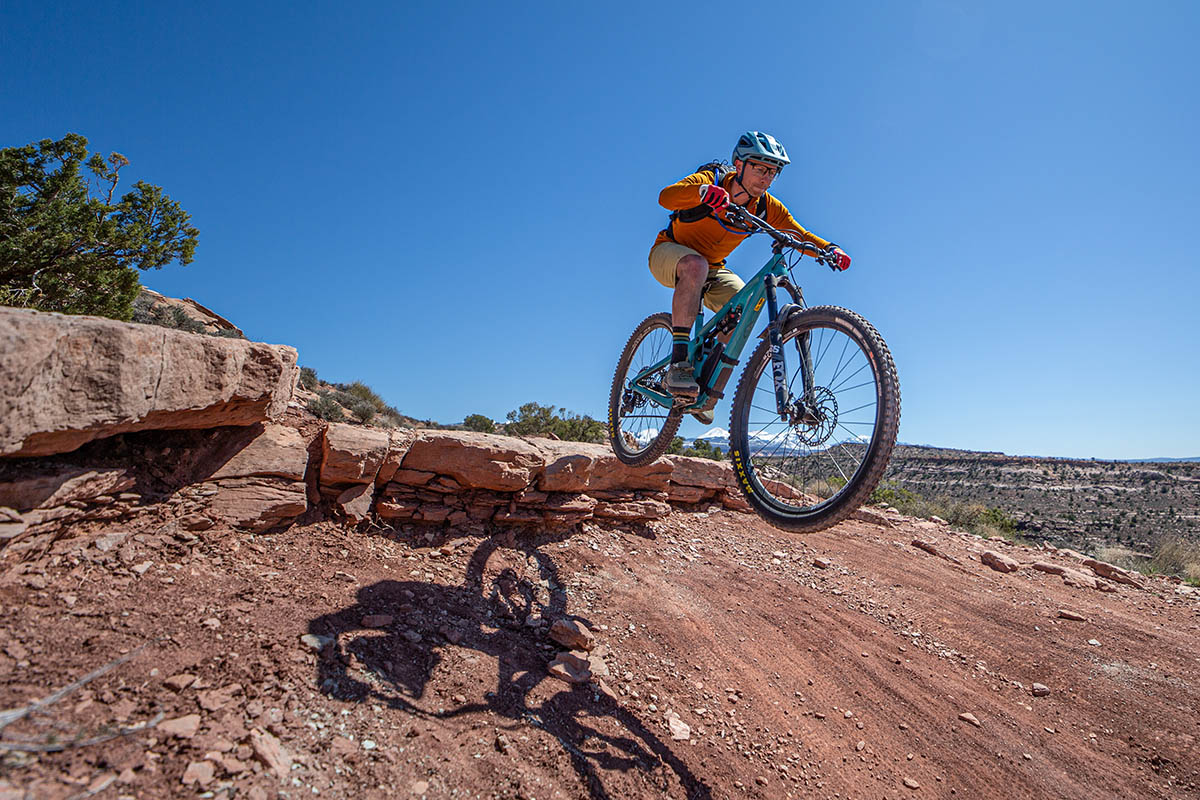
Whether it’s an all-mountain ripper or a lightweight XC whip, there’s a good chance you already know what you’re looking for if you’re spending in this price range. At this point, it’s helpful to compare the specs of each model closely and read rider reviews. Major players like Specialized and Santa Cruz offer a variety of bikes above $6,000, and you’ll also find plenty of carbon options from smaller boutique brands like Yeti Cycles and Ibis Cycles. You should also consider brand loyalty, or how committed you are to a certain company—you can find great (and new) models you’ve never heard of by looking at the entire landscape, including lesser-known names. Finally, it’s worth noting that you can spend well into the double digits for a top-of-the-line design like Specialized’s S-Works Epic 8 ($14,500), but mid-range options like the Epic 8 Expert ($7,000) offer more than enough performance for most serious riders.
.jpg)
If you’d still like some help narrowing down your selection, below are our team’s current favorite trail mountain bikes broken down by price point and category, from capable full-suspension rigs to bikepacking-ready hardtails and entry-level designs for those just starting out. For a wider look at the market and detailed buying advice to help you get going, check out our articles on the best trail mountain bikes under $1,500, best trail mountain bikes under $2,500, and best trail mountain bikes.
Best Hardtail: Cannondale Habit HT 2
Best Full-Suspension: Polygon Siskiu D6 SE
Best Full-Suspension: Polygon Siskiu T8
Best Hardtail: Salsa Timberjack XT 29
Best All-Around Trail Bike: Santa Cruz Hightower S
A Close Second (That’s More Playful and Customizable): Specialized Stumpjumper Evo
Best Downcountry Trail Bike: Specialized Epic Evo 8 Comp
Best Hardtail for Trail Riding and Bikepacking: Salsa Timberjack XT 29
Best E-Mountain Trail Bike: Specialized Turbo Levo Comp Alloy
Best Value in a Full-Suspension Bike: Ari Cascade Peak Pro
Best Entry-Level Trail Bike for Beginners: Salsa Rangefinder Deore 11 29
Back to our MTB Price Guide See our Mountain Biking Gear Reviews